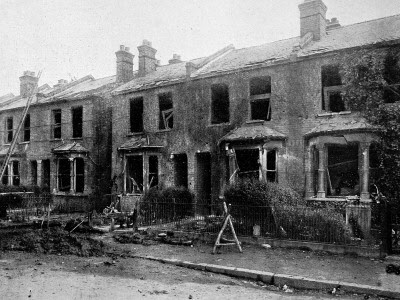 |
| British infantery go "Over the Top" usually to be met with a withering hail of enemy fire. |
On Christmas Day 1905, Esther's younger sister, had married Walter Huggins. Wally, as he was known, was twenty-seven when the war broke out in 1914. Although his records have been lost we know that Wally was a Lance Corporal in the 1st Battalion The Middlesex Regiment. Wally was killed on 28th October 1916. Daisy, left with four children, remarried the following year. Wally is commemorated on the Thiepval monument in France.
 |
| The Thiepval Memorial in France. |
I wrote in my previous post about Albert Charles Bayliss and three of his sons serving in the Post Office Rifles. One of the young officers in their unit was 2nd Lt. Wilfred Alfred Cotterill who was the brother of the famous war poet Rupert Brooke. Wilfred was killed in action near Le Rutoire Farm in 1916. Brother Rupert was killed in Greece.
As we have seen, Bert Bayliss came home in 1917, discharged from the army and diagnosed with tuberculosis. From what we know from his daughters, Florence and Ethel (although, as we have seen, their testimony must be treated with caution) he was not, at first, a complete invalid. Two stories about him are so vivid that I see no reason to question their veracity. The first is how Bert was sitting on the doorstep one evening when one of the horses being taken into the dairy became startled and bolted back up the street towards the main road. Bert leaped to his feet and managed to grab the horsed bridal. After calming the animal he swung himelf onto its back and rode it back to the dairy to applause from his neighbours.
 |
| Artist's impression of a Zeppelin airship over London. |
 |
| A German Gotha bomber of the type used to bomb England. |
The second tale is more serious. Between June 1915 and May 1918 Londoners experienced a new kind of warfare: air raids both by Zeppelin Airships and German bombers. While these raids were not as ferocious as those during the Second World War the terror they inspired cannot be under estimated - nobody had experience bombardment from the air before. In July 1915 a house in Marlborough Road, not far from the former home of Charles Bayliss, was rocked by an explosion. It turned out that the house has been hit by a British anti-aircraft shell. A bomb fell on the Islington Workhouse in St.John's Way, only a short walk from Windermere Road demolishing the laundry but with no loss of life. Islington suffered in at least fourteen air raids by Zeppinlins and Gotha bombers.
 |
| London houses after a Zeppelin raid. |
On 29th of September 1917 Bert Bayliss took his family to Archway Underground Station. In his book BRITAIN HOLDS ON 1917-1918, author C.E.Payne tells us :"...there were people who went to the Tube stations every night from five o'clock on. Grown ups took books and the children toys and they stayed on platforms and stairs for hours. The majority of people behaved bravely whilst raids were in progress, but the dread of their coming, the hasty flight to the Tubes and other recognised places of shelter wore down the nerves of many...everywhere, working women looked exhausted from sleepolessnes, anxiety and fear...Each night at this time, queues formed outside the Tube stations waiting to go down if an alarm was give."
We can pinpoint the events of the night of 29th September because after the raid was over Bert and Esther returned home and after having put the younger ones to bed left them in the care of the elder children (Bert and Florence) and went out again. Bad news travels fast and like many others they went to see the damage that had been done to The Eaglet pub in Seven Sisters Road. This might sound ghoulish but Bert and Esther had both friends and relatives in the area - indeed, Bert's sister Louisa lived in nearby Orpingley Road and a bomb had fallen there, behind numbers wrecking one house and injuring four women and two children. Luckily there were no fatalities in Orpingley Road but at The Eaglet pub it was a different story. The ground floor and first floor had been wrecked, a bomb or "aerial torpedo" (as it was described at the time) had gone through the cellar flap. A man and a woman had been killed, fifteen men, eighteen women and a child had been injured. Another man and woman later died from injuries.
 |
| The Eaglet Pub today. |
TO BE CONTINUED...
Hmm, I don't know The Eaglet, we must have a pint in there one day.
ReplyDelete